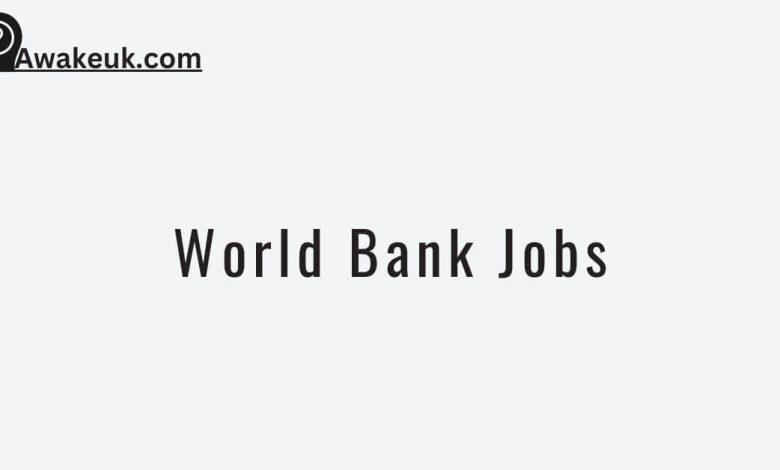World Bank Jobs – Economist

World Bank Group Transport Specialist Job Opening: The World Bank’s Transport (ISATI) Global Practice is seeking a dynamic individual to fill the position of economist at Nepal’s country office in Kathmandu. This is a three-year term position.
Introduction
If you’re an investor who wants to make a difference in the world, working for the World Bank could be the perfect job for you. The World Bank is an international organization that helps poor countries around the world with both money and advice. This piece will talk about what an economist at the World Bank does, what skills and qualifications they need, how to apply, and a lot more.
Understanding the World Bank
The World Bank was founded in 1944, and its main office is in Washington, D.C. The International Development Association (IDA) and the International Bank for Reconstruction and Development (IBRD) are the two organizations that make it up. The World Bank’s main goal is to fight poverty around the world and encourage long-term economic growth.
The Role of an Economist at the World Bank
Economists at the World Bank play a crucial role in shaping economic policies and strategies that address the challenges faced by developing countries. They work on various projects related to poverty reduction, infrastructure development, education, healthcare, and more. Their expertise is instrumental in providing financial solutions and policy advice to member countries.
Benefits of Working at the World Bank
- Consequences on a Global: One potential benefit of employment at the World Bank is the ability to make a meaningful contribution to worldwide development initiatives. Employees participate in initiatives that tackle critical concerns such as healthcare, education, infrastructure development, and poverty reduction.
- Culturally Diverse Environment: As a multicultural and diverse organization, the World Bank unites professionals from a variety of nations and cultural backgrounds. This diversity promotes an inclusive and productive workplace.
- Difficult Projects: The World Bank provides its employees with the opportunity to engage in intricate and demanding initiatives that seek to tackle urgent global challenges. This affords opportunities for intellectual development and professional advancement.
- Advancements in Professional Development: Continuous learning and professional development are priorities for the World Bank. Through the use of training programs, seminars, and other resources, employees may be able to expand their knowledge and abilities.
- Revolutionary Research and Innovation: To identify viable solutions to worldwide issues, the World Bank conducts research and development. There may be opportunities for employees to participate in pioneering research and creative endeavors.
- Compensatory Competitiveness: The World Bank attracts top talent with its competitive compensation packages. In addition to salaries, numerous benefits are frequently provided, such as health insurance, retirement programs, and supplementary allowances.
- Life-Work Balance: Although international development work can be arduous at times, the World Bank acknowledges the criticality of maintaining a healthy work-life balance. In support of the well-being of its employees, the organization might offer flexible work arrangements.
- Geographical Deployments: Certain job roles at the World Bank may entail overseas travel, providing staff with the opportunity to acquire practical experience in a variety of cultural and professional environments while working in different countries.
- The collaborative setting: The World Bank cultivates a cooperative workplace atmosphere wherein experts from various fields and origins function as members of multidisciplinary teams. The success of complex development initiatives is contingent upon collaboration.
- Global Resource Access: World Bank personnel are granted access to an extensive collection of resources, encompassing research discoveries, collaborations, and data. This access enables the implementation of projects in an efficient and well-informed manner.
- Dedication to Inclusion and Diversity: The World Bank is dedicated to promoting inclusion and diversity. The viewpoints of individuals possessing diverse cultural backgrounds, experiences, and abilities are highly esteemed by the organization.
Qualification and Experience for World Bank Jobs
The candidate must possess a Master’s degree (Ph.D. is preferred) in Economics, Statistics, Mathematics, Public Policy, or another related discipline, possess a strong quantitative background, and have at least five years of relevant professional experience.
This is a local recruitment position as per the Nepal compensation plan.
Details (Job # req23700) can be found at www.worldbank.org/jobs. All applications must be submitted via this online form. The World Bank Group is committed to attaining gender, nationality, culture, and educational background diversity. Individuals with disabilities are encouraged to register in equal measure.
Check Also: Career Opportunity at Timken 2024 – Visit Here
How to Apply for World Bank Jobs?
If you wish to enroll, please visit the link provided.
Conclusion:
To sum up, becoming an economist at the World Bank gives you the chance to use your knowledge of economics to change the world. As long as you have the right skills and are fully committed to the institution’s purpose, you can help shape global economic policies and fight poverty.
People Also Ask:
-
What are the requirements for a World Bank job?
Demonstrate 3+ years of relevant experience, or equivalent, in continuing study at the doctoral level. For IFC deployment: Demonstrate 4+ years of relevant experience in finance, project/program development, economic development, and consulting.
-
Which degree is best for the World Bank?
Possess a Master’s qualification with at least three years of relevant professional experience in development, or continue academic studies at the doctoral level, holding a Ph.D.
-
Who can work for the World Bank?
The Bank Group’s recruitment policy is to hire staff of the highest caliber on as wide a geographical basis as possible, with preference to nationals of WBG member countries or countries of operations. Internationally recruited staff (IRS) need global mobility and international experience.



